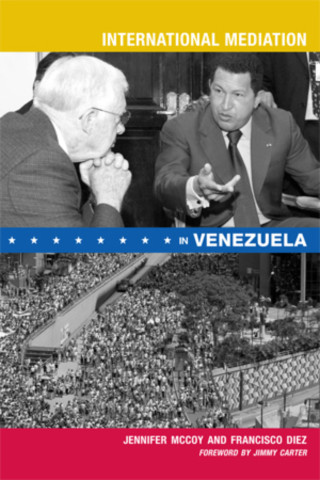International Mediation in Venezuela
International Mediation in Venezuela analyzes the effort of the Carter Center and the broader international community to prevent violent conflict, to reconcile a deeply divided society, and to preserve democratic processes. From their perspective as facilitators of the intervention and as representatives of the Carter Center, Jennifer McCoy and Francisco Diez present an insider account of mediation at the national and international level.
Jennifer McCoy
Jennifer McCoy, PhD, is a political science professor at Georgia State University. She was named a Distinguished University Professor in the inaugural class of 2013 and served as director of the Global Studies Institute (2015-16). Prior to this, Dr. McCoy served as Director of the Carter Center’s Americas Program (1998-2015), leading projects on democratic strengthening, mediation and dialogue, and hemispheric cooperation. A specialist on democratization and polarization, mediation and conflict prevention, election processes and election observation, and Latin American politics, Dr. McCoy has authored or edited six books and dozens of articles. Her latest volume is Polarizing Polities: A Global Threat to Democracy, co-edited with Murat Somer (2019). She teaches courses on democratic erosion, comparative democratization, international norms, and Latin American politics.
Dr. McCoy’s current research project on Polarized Democracies seeks to determine the causes, consequences and solutions to polarized societies around the world, including Venezuela, Turkey, Hungary, Thailand, Hungary, Greece, Bangladesh, Philippines and the United States. Leading a group of international scholars and funded by NSF, International Studies Association, and Central European University, McCoy organized two international workshops whose work was published as book-length volumes of the American Behavioral Scientist (Jan 2018) and Annals of the American Academy of Political and Social Science (January 2019). She is currently working on the micro-foundations of severe polarization and democratic erosion. In particular, she is researching possible antidotes to the hostility and distrust of the “Other” and decreasing support for democracy caused by Us vs Them polarizing strategies of populist political leaders. This collaborative work includes online survey experiments in the U.S., Hungary and North Macedonia, funded by a GSU Provost Faculty Fellowship, Central European University, and a residential fellowship at the Institute of Advanced Study in Budapest (spring 2019).
McCoy recently completed a research project funded by USAID and NSF on Legitimacy Deficits in Transitional Justice in the Colombian Peace Process, with Ryan Carlin, Jelena Subotic and Greg Love. Dr. McCoy also participates in Team Populism — an international research team on Causes and Consequences of Populism, comparing Latin America, North America and Europe. She has received research grants and awards from NSF, USAID Center for Democracy, US Institute of Peace, Rockefeller Foundation, North-South Center, and Fulbright Association.
At The Carter Center, Dr. McCoy created the group of Friends of the Inter-American Democratic Charter; directed The Carter Center’s projects on Mediation and Monitoring in Venezuela 2002-2004, Ecuador-Colombia Dialogue Group 2008-2010, and U.S.-Andean Dialogue Group 2010-2011; led over a dozen election monitoring missions and organized former President Carter’s historic trips to Cuba in 2002 and 2011. She served as a mediator in Venezuela, and between Ecuador and Colombia, and published with Francisco Diez an analysis of the Venezuelan conflict in International Mediation in Venezuela (USIP Press, 2011).
McCoy is a life member of the Council on Foreign Relations; member of the International Women’s Forum; and co-chair of the Atlanta chapter of the Scholar’s Strategy Network.
Francisco Diez
Francisco Diez is an Argentine mediator and works as a private consultant, maintaining a working relationship with the Carter Center since 1991. He served as the Carter Center's field representative in Caracas from 2002 to 2004 and its representative in Latin America from 2007 to 2009. He has also been a member of several international electoral observation missions and is coauthor of Tools for Working in Mediation.

